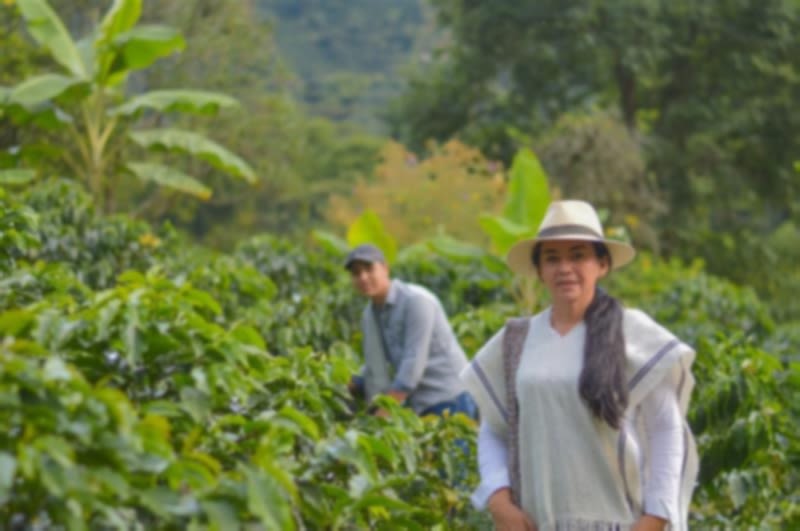Advancing Women Entrepreneurs in the Economic Reactivation of Post-Conflict Colombia
Serena Caucci, Jairo Guzman, and Zeynep Ozkul

The consequences of internal conflict are severe on communities and profoundly affect the socioeconomic structures of rural areas and livelihoods (Navarrete 2020). Global patterns show that inequality and conflict are inextricably linked and lock countries in a trap where inequality cause increased conflicts and vice versa (Dahlum et al. 2019). The conflict-inequality trap emerging in conflict and post-conflict situations has a disproportionate impact on women and girls (UNDP 2016). Reinforcing long-term strategic efforts to empower women through support measures and initiatives that tackle gender inequality is crucial for building long-lasting peace.
Promoting gender equality through employment and self-employment is not an easy task in post-conflict situations yet is one of the most effective ways to create stability and enable socioeconomic transformation (UNDP 2016). Stimulating women’s involvement in the labour market and creating an environment where women-owned businesses can prosper is therefore key for keeping the path towards poverty reduction, balanced economic growth, and sustainable development.
In Colombia, 26 per cent of the landholdings controlled by natural persons are run by women (Guereña 2017). Complex social and economic conditions shaped by many years of armed conflict and lack of security have made Colombian women living in rural areas victims but also main agents in establishing peacebuilding processes. Women are catalysts of sustainable development. They continuously challenge boundaries and existing structures, which is also relevant when it comes to being innovative entrepreneurs, especially in the agricultural sector. The concept of the traditional rural household family labour and asset allocation have been drastically changing under migration and other cultural transformations (Garner and de la O Campos 2014). A gender lens to sustainability and the social dimension of sustainable agriculture and biodiversity conservation needs to be given more focus all around the globe. It is not different in Colombia, where the agricultural sector is expected to be hit seriously by climate change which will directly impact food security, agrarian socioeconomics, and conservation of its enormously rich biodiversity.
Acknowledging the role of women as social entrepreneurs who improve the agricultural value chain and as key agents of rural development is a crucial step towards supporting communities to achieve sustainable agriculture and food security and protect biodiversity in a sustainable manner. Efforts are ongoing in Colombia to support female entrepreneurship and incorporate women more thoroughly in the economy (Powers and Magnoni 2012). The Agricultural Association of Women of Rio Negro (ASOAMUR) – a collective initiative among farmers from Cundinamarca, Colombia, where women make up 80 per cent of the population – helps promote sustainable livelihood in the peacebuilding process and is an example of good practice in the region. ASOAMUR has focused on enhancing food security in the region through self-employment that allows small scale businesses to earn a fair income. They have been working with local partners to foster sustainable practices and empower female-headed households. Examples of the association’s work include promoting the poultry industry at local markets at the family level owned by women heads of households, or the establishment of a start-up that produces wine made from oranges produced in the region (Pacho-Cundinamarca), altogether encouraging agricultural markets to promote self-sufficiency in the area.
By supporting women-led businesses and creating equal opportunities in the market, ASOAMUR also helps to curb food waste, as in the case of oranges, which were previously wasted in the transportation stage or thrown out due to low market prices.





The United Nations and its various entities persistently work to increase the recognition of women’s contributions to economic development and strengthen the capacities of women entrepreneurs, which is key for poverty reduction, social wellbeing, and sustainable economic growth. Acknowledging that ‘economies that work for women, work for everyone’ , the UN strives to advance women entrepreneurs as the powerful drivers of sustainable development who have key roles in inclusive and sustainable growth that will pave the way forward for the next generations.
UN Women takes the lead in the fight for gender equality and the empowerment of women. So far, several flagship initiatives have been established by UN Women which focus on strengthening the voice of women as entrepreneurs and removing structural gender-specific barriers faced by women. The Women’s Entrepreneurship Accelerator is a recent multi-partner initiative designed to inspire, educate, and empower women entrepreneurs around the world. The initiative aims to empower 5 million women entrepreneurs by 2030 and maximise the development impact of women entrepreneurship by creating transformative change to provide an environment of growth, sustainability, and resilience for women entrepreneurs worldwide. As part of the UN System’s socioeconomic response, the Catalysing Women’s Entrepreneurship programme by UNESCAP aims to advance women entrepreneurship and market participation in the Asia Pacific region. With its ultimate objective of supporting human development, UNDP has boosted its efforts and mobilised governments around the world for enacting gender-responsive policies to strengthen women’s economic security and support women-led micro, small, and medium enterprises.
The support of the international community linked with local, regional, and national strategies can create useful knowledge about opportunities and economic synergies. However, despite the efforts to close the gender gap, women entrepreneurs in Colombia and around the world still struggle to take their rightful place in economic life due to the lack of supportive entrepreneurship conditions and opportunities. Increased efforts are needed to reinforce women’s place in the market, challenge dynamics of discrimination, and support women’s self-employment and development. To respond to the social and economic challenges in Colombia, the food industry needs to extend its support from agricultural production to enhancing capacities in the context of digitalisation, marketing, international business, and environmental processes across every level of government (DPO 2020).
UNU-FLORES is joining forces with ASOAMUR to unlock economic opportunities for Colombian women and promote peace and security in rural Colombia. The combined efforts foster women’s entrepreneurship, support local economic reactivation of women, and expand their employment opportunities. Through capacity building, the Resource Nexus is sought to promote economic development through ecosystems conservation and biodiversity protection in the region. UNU-FLORES seeks to reach higher efficiency of resource use by developing new business models in the food supply chain in Colombia. UNU-FLORES works within the national climate change policy guidelines for promoting smart agriculture based on the Resource Nexus to support a smooth adaptation of species to climate changes and a higher gene flow of endemic species. These efforts are timely and critical with the decline of biodiversity in post-conflict zones; furthermore, resource exploitation is possible in post-conflict areas that were previously off-limits to the extractive industry and a lack of landscape planning for natural resources management is constantly observed (Suarez 2016).





A well-functioning agricultural sector and preserving natural resources and biodiversity are the core of securing livelihoods in rural communities. Colombia has the world's largest number of species-per-unit area and is listed as one of the world's mega-diverse countries, home to approximately 10 per cent of the world's fauna and flora (Hodson de Jaramillo et al. 2017). However, the future of this unique biodiversity that is a source of numerous ecosystems and livelihood shaped by farmers and communities for millennia is now threatened. A pressing challenge today is figuring out how to increase production to meet the growing demand for food while preserving biodiversity and reducing the burden on natural resources, which are further aggravated by climate change and the global economic crisis.
Empowering Colombian female entrepreneurs through new business models and providing targeted support to help them gain visibility will create the force to help communities recover from the violent conflicts, empower the rural economies, support enhancing food security, and help to preserve functioning ecosystems. Tackling the challenges to stimulate female social entrepreneurship generated by gendered labour divisions, gaps in education, training, and finance, lack of representation in decision-making and gender stereotypes should be the priority of all stakeholders in the Colombian agricultural sector. Changing the patterns to explore the potential of business inclusion of women at the farm and supply chain level promoting and integrating gender diversity and managerial positions should also be, therefore, prioritised on policy agendas.
Strengthening women’s participation and eliminating the obstacles women face in joining economic activities might be the key to harnessing the potential of peacebuilding efforts in Colombia. Entrepreneurship provides a pathway for income generation, poverty reduction, and improvements in household welfare. Providing an opportunity for women to engage in economic activity both as entrepreneurs and the primary managers of natural resources in many conflict-affected settings can also lead to better peacebuilding outcomes.
UNU-FLORES strives to reflect on gender equality and bridge the gender gap by promoting mechanisms for raising capacity for effective climate change-related planning and management in developing and emerging countries, with a focus on local and marginalised communities. A better understanding on managing the nexus between natural resources and its subsequent ramifications on gender equality and social inclusiveness would help us to better secure livelihoods and human rights to water and food.




REFERENCES
Dahlum, S., Nyg˚ard, H. M., Rustad , S. A., & Østby, G. 2019. "The Conflict–Inequality Trap: How Internal Armed Conflict Affects Horizontal Inequality". In: UNDP Human Development Report BACKGROUND PAPER. United Nations Development Programme (UNDP).
DPO. 2020. Department of peace operations of the United Nations. Gender-Responsive DDR, Promoting the Women, Peace and Security Agenda. [Accessed on 28 September 2021].
Garner, E., & de la O Campos, A. P. 2014. "Identifying the “family farm” An informal discussion of the concepts and definitions". No. 14-10: ESA Working Paper. Agricultural Development Economics Division Food and Agriculture Organization of the United Nations.
Guereña, A. 2017. A Snapshot Of Inequality What The Latest Agricultural Census Reveals About Land Distribution In Colombia. Oxfam International.
Hodson de Jaramillo, E., Castaño, J., Poveda, G., Roldán, G., & Chavarriaga, P. 2017. "Food and Nutrition Security in Colombia". In: Challenges and Opportunities for Food And Nutrition Security in the Americas: The View of The Academies of Sciences. InterAmerican Network of Academies of Sciences (IANAS).
Maconachie, R., Binns, T., Tengbe, P. 2012. "Urban farming associations, youth and food security in post-war Freetown, Sierra Leone". Cities 29:192-200.
Navarrete, A., Birkenberg, A., Birner, R. 2020. "Factors Influencing the Development of Rural Producer Organizations in Post-War Settings. The Case of Coffee Growers Associations in Southern Tolima, Colombia". Int. J. Commons 14:692–713.
Powers, J., & Magnoni, B. 2012. Pure Perseverance: A Study of Women’s Small Businesses in Colombia Understanding success factors of women’s and men’s small businesses in Bucaramanga, Colombia. Inter-American Development Bank.
Suarez, A., Arias, P., Martinez, E. 2016. "Environmental sustainability in post-conflict countries: insights for rural Colombia". Environ Dev Sustain 20:997–1015.
The UN General Assembly (UNGA). 2013. Statement by the Chair of the Peacebuilding Commission: Women’s economic empowerment for peacebuilding.
Toro, E., Roldan, I. 2018. "Estado del arte, propagación y conservación de Juglans neotropica Diels., en zonas andinas". Madera y Bosques 24:e2411560.
UNDP. 2016. Conducting a Conflict and Development Analysis (CDA). Accessed July 7, 2021.
Photo/video credits (in order of appearance):
UNU-FLORES; Unsplash/Fernanda Fierro; Unsplash/Anette-Bratteberg; Unsplash/Flavia-Carpio; iStock/PolacoStudios; ASOAMUR, Gizeth Gomez; Shutterstock/Tatan Herrera; Unsplash/Mathias P. R. Reding; Unsplash/Luis Vidal; Unsplash/Jorge Gardner; Pexels/Chris Rodriguez; Journalism Department, Brigade XIII - Army, Ministry of defense; Shutterstock/Wirestock Creators; Shutterstock/Jess Kraft; Shutterstock/fernandoalonsostockfilms; Unsplash/Alexander Schimmeck; Pixabay/youleks; Shutterstock/fernandoalonsostockfilms; Unsplash/datingscout
